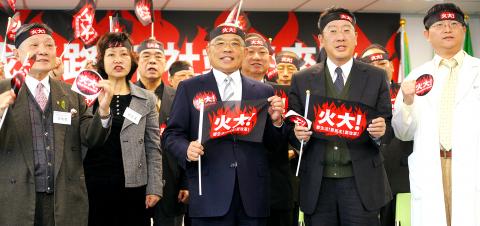The legislature yesterday revised regulations to demand that public servants deprived of their positions because they hold dual nationality return the amount they earned during their term of office in the public sector.
Democratic Progressive Party (DPP) Legislator Chiu Chih-wei (邱志偉), who sponsored the amendment to the Civil Service Employment Act (公務人員任用法), said that the revision was aimed at “cultivating loyalty among public servants.”
Public servants are barred from holding dual citizenship under the Nationality Act (國籍法) and face dismissal for violating the regulation, but there was no stipulation demanding that they pay financial compensation.

Photo: George Tsorng, Taipei Times
Meanwhile, lawmakers removed a clause from the act that disqualified people with physical disabilities from being hired as public servants despite them being qualified as prescribed by a related act.
The legislature also approved an amendment to the Criminal Procedural Act (刑事訴訟法) to provide legal protection for economically disadvantaged people and Aborigines, by requiring the mandatory presence of lawyers both when people from these groups are questioned by prosecutors and when they appear in court for trial.
Chinese Nationalist Party (KMT) Legislator Jeng Tian-tsair (鄭天財) hailed the revision as a big step forward in protecting Aboriginal people’s judicial rights.
The legislature enacted the Act on Cross-Border Transfer of Prisoners (跨國移交受刑人法) to set out the legal basis for transferring prisoners between nations, including regulations pertaining to calculations on time remaining to be served and procedures for the transfer of prisoners, to ensure that the process is carried out smoothly.
According to government statistics, about 1,500 Taiwanese are serving sentences abroad, with 1,000 in China and more than 500 in Southeastern Asian countries, while Taiwan holds 492 foreign prisoners.
Under the act, the transfer of prisoners requires consent from both the prisoner’s home country and host country, while the prisoner must agree to the transfer through his or her own free will.
The legislature also required a report from the Judicial Yuan, the Ministry of Justice, the Mainland Affairs Council, the Ministry of Foreign Affairs and the Ministry of the Interior on the situation of Taiwanese incarcerated in other countries.

The Ministry of Economic Affairs has fined Taobao NT$1.2 million (US$36,912) for advertisements that exceed its approved business scope, requiring the Chinese e-commerce platform to make corrections in the first half of this year or its license may be revoked. Lawmakers have called for stricter enforcement of Chinese e-commerce platforms and measures to prevent China from laundering its goods through Taiwan in response to US President Donald Trump’s heavy tariffs on China. The Legislative Yuan’s Finance Committee met today to discuss policies to prevent China from dumping goods in Taiwan, inviting government agencies to report. Democratic Progressive Party Legislator Kuo Kuo-wen (郭國文) said

The Ministry of Economic Affairs has fined Taobao NT$1.2 million (US$36,900) for advertisements that exceeded its approved business scope and ordered the Chinese e-commerce platform to make corrections in the first half of this year or its license would be revoked. Lawmakers have called for stricter supervision of Chinese e-commerce platforms and more stringent measures to prevent China from laundering its goods through Taiwan as US President Donald Trump’s administration cracks down on origin laundering. The legislature’s Finance Committee yesterday met to discuss policies to prevent China from dumping goods in Taiwan, inviting government agencies to report on the matter. Democratic Progressive Party

Taiwan and its Pacific ally Tuvalu on Tuesday signed two accords aimed at facilitating bilateral cooperation on labor affairs, according to Taiwan’s Ministry of Foreign Affairs (MOFA). The governments inked two agreements in Taipei, witnessed by Foreign Minister Lin Chia-lung (林佳龍) and visiting Deputy Tuvaluan Prime Minister Panapasi Nelesone, MOFA said in a news release. According to MOFA, the agreements will facilitate cooperation on labor issues and allow the two sides to mutually recognize seafarers’ certificates and related training. Taiwan would also continue to collaborate with Tuvalu across various fields to promote economic prosperity as well as the well-being of their

Sung Chien-liang (宋建樑), who led efforts to recall Democratic Progressive Party (DPP) Legislator Lee Kun-cheng (李坤城), was released on bail of NT$80,000 today amid outcry over his decision to wear a Nazi armband to questioning the night before. Sung arrived at the New Taipei District Prosecutors’ Office for questioning in a recall petition forgery case last night wearing a red armband bearing a swastika, carrying a copy of Adolf Hitler’s Mein Kampf and giving a Nazi salute. Sung left the building at 1:15am without the armband and covering the book with his coat. Lee said today that this is a serious